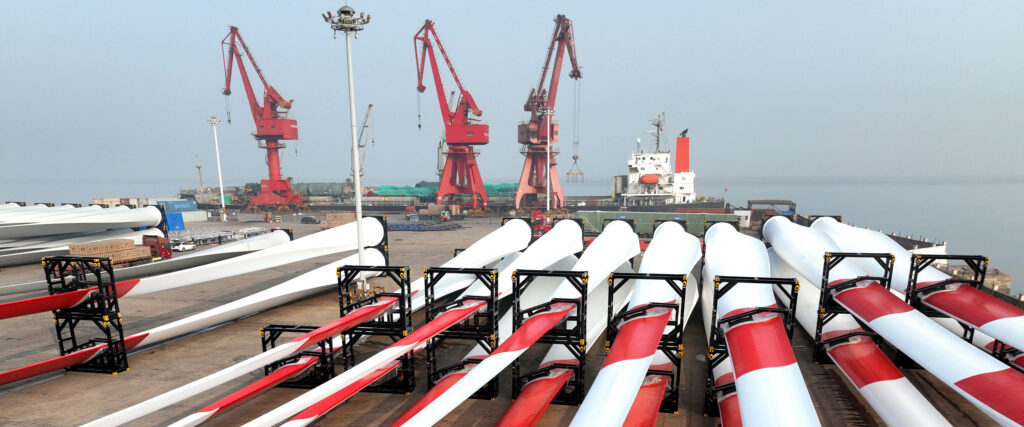Trade’s role in climate action
International trade can play a vital role in tackling climate change and achieving sustainable development. But it calls on governments to set aside national interests and open up access to environmental goods, services, and technologies for all countries
Climate — Global

Historians say the past is a foreign country. While predicting what future historians would say about the current era is uncertain, the story would certainly not be inconsequential. The defining crisis of our time – climate change – is increasingly interlocked with a confluence of other crises including health, food, security, finance, and trade.
The future we want is clear: that of a net-zero, climate-resilient, nature-positive, resource-efficient, and economically sustainable world. Climate science tells us that the shape of the future will depend on our immediate actions: global greenhouse gas emissions must peak by 2025, and then we must see urgent and deep reductions in emissions by 2030 to achieve net zero by 2050.
Measures to address the climate crisis must be compatible with policy ambitions for economic growth and human advancement. The 17 Sustainable Development Goals (SDGs) embody a shared blueprint for planet, people, and prosperity, now and into the future. SDG 17 highlights that international trade is “a means of implementation” for the achievement of all the SDGs. On the road to net zero, the question is not whether trade matters for accelerating climate ambition, but how and to what extent can trade measures address climate change.
A symbiotic relationship
Conventional wisdom purports that trade and climate are irreconcilable. The idea is that either:
- the environment must be sacrificed to achieve a certain level of economic development
- economic growth must be undermined to cultivate environmental sustainability
However, the interlinkages between climate change and trade are much more intense. Economic and environmental factors are interdependent, and success in one sector requires action in other sectors to be sustained over time.
In 1992, the United Nations Conference on Environment and Development led to the adoption of the UN Framework Convention on Climate Change (UNFCCC). It also witnessed the signing of the Rio Declaration, one of the most important global declarations establishing a link between sustainable development, economic growth, and environmental protection. The declaration called on all countries to “cooperate to promote a supportive and open international economic system that would lead to economic growth and sustainable development in all countries, to better address the problems of environmental degradation.”
In 1994, the signing of the Marrakesh Agreement established the World Trade Organization (WTO). It enshrined the link between sustainability and the opening up of trade, recognizing that while trade “should be conducted with a view to raising standards of living” it should also allow for the “optimal use of the world’s resources in accordance with the objective of sustainable development.”
The symbiotic relationship between climate and trade has important implications for enabling the international climate and trade regimes to work in a more synergistic fashion. There is ample untapped potential for policymakers to go further in making use of climate provisions in trade agreements and trade-liberalizing commitments in climate action plans and strategies.
Renegotiating the climate–trade nexus
Trade is by nature relational. International trade agreements and rules that embed sustainable development provisions and promote green investment would provide incentives for the multilateral trading system to both further the symbiotic supportiveness of free and fair trade and address the climate crisis. The key issue is to strive for an optimal combination of trade liberalization and climate policies that harness the benefits of trade while minimizing environmental costs.
Trade and climate synergies could be enhanced through negotiating future multilateral, plurilateral, and bilateral trade agreements. The WTO-based international trade regime could potentially restructure market relationships in a climate-friendly manner by providing incentives for climate change mitigation and adaptation. According to the WTO, reducing or eliminating import tariffs and non-tariff barriers for climate-friendly goods and technologies could result in a reduction of their price, therefore facilitating their production and deployment at the lowest possible cost.
A prime example emphasizing that trade needs to be part of the solution to climate change is the Environmental Goods Agreement (EGA). Negotiations to establish the EGA started in 2014 but have stalled since 2016. The EGA envisages liberalizing the trade of environmental goods and services to meet environmental and climate goals, including through:
- addressing supply chain obstacles to sustainable trade
- generating useful economic resources to allow the transition from fuel-intensive industries to less polluting industries
- lowering the cost of green energy technologies
Revitalizing climate-trade negotiations will be vital to the achievement of SDG 10 (reduce inequality within and among countries).
Trade-liberalizing commitments in climate instruments such as countries’ national climate plans have yet to be fully explored. If international trade agreements incorporate some of the climate measures included in nationally determined contributions (NDCs), submitted to the UNFCCC for the implementation of the Paris Agreement, it could be another way of strengthening the capacity of countries to honor their climate pledges.
Mainstream circularity
The extent to which trade can create positive synergies with climate mitigation and adaptation is closely linked with not only the international trading system but also the design of domestic policies. Climate change is inherently contextual. Domestic conditions for liberalizing trade of goods and services are related to essential circular economy activities, crucial for the long-term transition to net zero.
Rising environmental impacts are due to unsustainable consumption and production. Governments around the world need to implement more ambitious, short-term and long-term action plans and strong measures to make their economies more circular. The circular economy is a future-oriented and broad-based approach to using resources sustainably throughout the product life cycle. In contrast to traditional, linear economic growth models, circular economy solutions, albeit still relatively niche, have proven to create opportunities for economic diversification, resource savings, and better human health and environmental outcomes.
Transitioning to a circular economy will reduce pressure on natural resources and create sustainable growth and jobs. It is essentially underpinned by a whole-of-society, human-centered approach, and speaks directly to SDG 16 on peace, justice, and strong institutions. The interlinked nature of the SDGs should inform mainstreaming the idea of a global circular economy into national plans and sustainable development strategies.
Towards a better future
Freer and fairer trade is not an end in itself. It is interlinked with important environmental and human values and the realization of all the SDGs. The future of trade must find a balance between promoting trade liberalization and creating the enabling conditions for countries to implement their climate promises under the UNFCCC, so that trade contributes to addressing the climate crisis and economic diversification.
Achieving the SDGs as a universal agenda requires policy coherence at all levels – national, regional, and global – where trade and climate are one part of the puzzle. A better future is possible, in which trade and climate can be integrated, complemented, and empowered to serve humanity.





